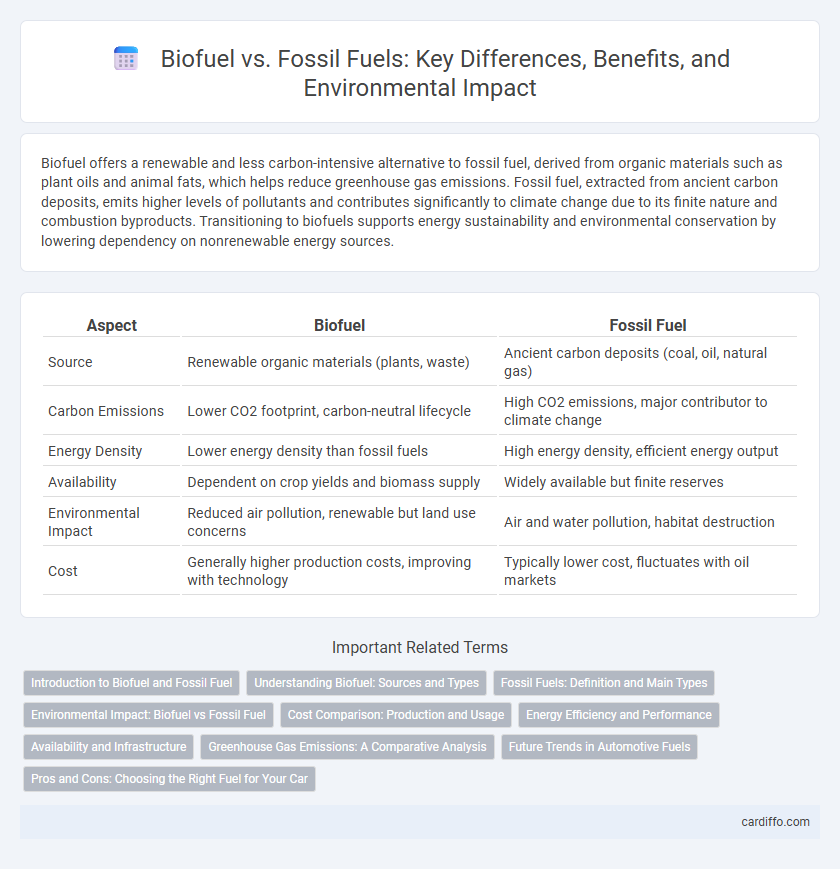Biofuel offers a renewable and less carbon-intensive alternative to fossil fuel, derived from organic materials such as plant oils and animal fats, which helps reduce greenhouse gas emissions. Fossil fuel, extracted from ancient carbon deposits, emits higher levels of pollutants and contributes significantly to climate change due to its finite nature and combustion byproducts. Transitioning to biofuels supports energy sustainability and environmental conservation by lowering dependency on nonrenewable energy sources.
Table of Comparison
| Aspect | Biofuel | Fossil Fuel |
|---|---|---|
| Source | Renewable organic materials (plants, waste) | Ancient carbon deposits (coal, oil, natural gas) |
| Carbon Emissions | Lower CO2 footprint, carbon-neutral lifecycle | High CO2 emissions, major contributor to climate change |
| Energy Density | Lower energy density than fossil fuels | High energy density, efficient energy output |
| Availability | Dependent on crop yields and biomass supply | Widely available but finite reserves |
| Environmental Impact | Reduced air pollution, renewable but land use concerns | Air and water pollution, habitat destruction |
| Cost | Generally higher production costs, improving with technology | Typically lower cost, fluctuates with oil markets |
Introduction to Biofuel and Fossil Fuel
Biofuels are renewable energy sources derived from organic materials such as crops, algae, and waste, offering a sustainable alternative to fossil fuels. Fossil fuels, including coal, oil, and natural gas, are formed from ancient organic matter over millions of years and remain the dominant global energy source despite their carbon-intensive impact. The transition from fossil fuels to biofuels is driven by the need to reduce greenhouse gas emissions and improve energy security through renewable resources.
Understanding Biofuel: Sources and Types
Biofuel is derived from organic materials such as crop residues, algae, and animal fats, offering a sustainable alternative to traditional fossil fuels like coal and petroleum. Major types of biofuels include ethanol, biodiesel, and biogas, each produced through processes like fermentation, transesterification, and anaerobic digestion. These renewable sources reduce greenhouse gas emissions and dependence on finite fossil fuel reserves, promoting energy security and environmental sustainability.
Fossil Fuels: Definition and Main Types
Fossil fuels are hydrocarbon-based energy sources formed from the remains of ancient plants and animals over millions of years, primarily including coal, oil, and natural gas. These fuels are extracted from underground reservoirs and power global industries, transportation, and electricity generation. Their combustion releases significant carbon dioxide, contributing heavily to greenhouse gas emissions and climate change.
Environmental Impact: Biofuel vs Fossil Fuel
Biofuel significantly reduces greenhouse gas emissions compared to fossil fuel by utilizing renewable organic matter, which absorbs CO2 during growth, resulting in a lower carbon footprint. Fossil fuels release carbon that has been stored underground for millions of years, leading to higher levels of atmospheric CO2 and contributing to climate change. Unlike fossil fuels, biofuel combustion emits fewer pollutants such as sulfur oxides and particulate matter, decreasing air pollution and environmental degradation.
Cost Comparison: Production and Usage
Biofuel production costs are generally higher due to agricultural inputs and processing technology, while fossil fuels benefit from established extraction and distribution infrastructures reducing per-unit expenses. Usage costs of biofuels can be lower environmentally, but engine modifications and lower energy density typically increase operational expenses compared to fossil fuels. Over time, advancements in biofuel technology and scaling production could narrow the cost gap with fossil fuels, making biofuels more economically competitive.
Energy Efficiency and Performance
Biofuels generally exhibit lower energy density compared to fossil fuels, resulting in reduced energy efficiency per unit volume. However, biofuels offer better combustion performance with lower emissions of carbon monoxide and particulate matter. Fossil fuels maintain higher energy content and engine power output but contribute significantly to greenhouse gas emissions and environmental degradation.
Availability and Infrastructure
Biofuel availability depends on agricultural output and renewable resources, offering a sustainable alternative to finite fossil fuel reserves. Infrastructure for fossil fuels is extensively developed globally, including pipelines, refineries, and distribution networks, whereas biofuel facilities and supply chains are still expanding and adapting to regional agricultural capacities. Transitioning to biofuels requires investment in specialized production plants and modifications to existing fueling stations to support widespread adoption.
Greenhouse Gas Emissions: A Comparative Analysis
Biofuel combustion generates significantly lower greenhouse gas emissions compared to fossil fuels, primarily due to the carbon-neutral cycle of biomass growth and consumption, which absorbs CO2 during cultivation. Fossil fuels release stored carbon accumulated over millions of years, resulting in a substantial and continuous increase in atmospheric greenhouse gases. Lifecycle analyses reveal that biofuels can reduce greenhouse gas emissions by up to 60-80% relative to conventional gasoline and diesel, making them a vital strategy for mitigating climate change.
Future Trends in Automotive Fuels
Biofuel adoption is expected to accelerate due to advances in sustainable feedstock technologies and government incentives targeting carbon neutrality. Fossil fuels will continue to dominate in the short term, but declining reserves and stricter emissions regulations drive automotive industries toward hybrid and fully electric powertrains integrating biofuel blends. Innovations in enzyme-based biofuel production and second-generation biofuels position the market for significant growth by 2030, reshaping the energy landscape of transportation.
Pros and Cons: Choosing the Right Fuel for Your Car
Biofuel offers renewable energy with lower carbon emissions, reducing environmental impact compared to fossil fuels that emit high greenhouse gases and contribute to climate change. While fossil fuels provide higher energy density and widespread infrastructure, they depend on finite resources with volatile prices and pollution risks. Selecting the right fuel involves balancing biofuel's sustainability benefits against fossil fuel's energy efficiency and availability.
Biofuel vs Fossil Fuel Infographic

 cardiffo.com
cardiffo.com